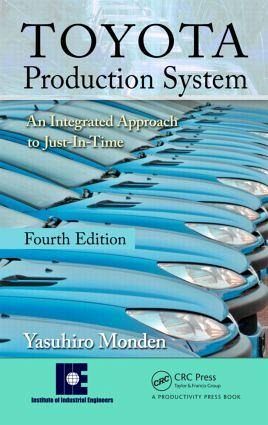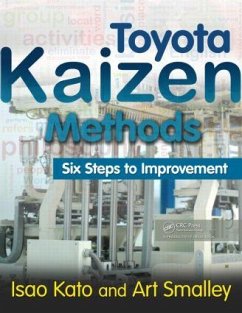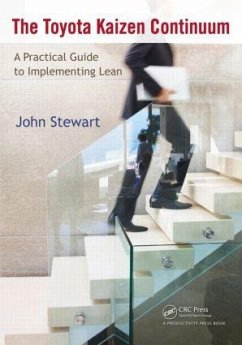
Yasuhiro Monden (Mejiro University)
Gebundenes Buch
Toyota Production System
An Integrated Approach to Just-In-Time, 4th Edition
Versandkostenfrei!
Versandfertig in 1-2 Wochen

PAYBACK Punkte
46 °P sammeln!




Covers the framework of Toyota Production System (TPS), including its theoretical underpinnings as well as pragmatic information on how it is implemented. This work presents the developments in TPS at Toyota. It focuses on electronic Kanban systems, computer-based information systems, and cellular manufacturing systems versus conveyor lines.
Yasuhiro Monden is professor emeritus at the University of Tsukuba, Japan. He also currently serves as visiting professor in the graduate program of the Nagoya University of Commerce and Business. Monden held the position of professor at Tsukuba University from 1983 to 2004. Before coming to Tsukuba, he was an associate professor in the School of Economics at Osaka Prefecture University (1971-83) and a research associate and assistant professor in the School of Law and Economics at Aichi University (1966-71). He received his Ph.D. in Management Science and Engineering from the University of Tsukuba, where he also served as dean of the Graduate Program of Management Sciences and Public Policy Studies and as chairperson of the Institute of Policy and Planning Sciences. He received his MBA from Kobe University, Japan, and his Bachelor of Economics from Kwansei Gakuin University, Japan. Dr. Monden has gained valuable practical knowledge and experience from his research and related activities in the Japanese automobile industry. He was instrumental in introducing the JIT production system to the United States. Toyota Production System is recognized as a JIT classic and was awarded the 1984 Nikkei Prize by the Nikkei Economic Journal. However, his research fields are wide, covering not only production and operations management but also managerial and financial accounting, corporate finance, and business economics. His dissertation title was "Basic Research on Transfer Pricing and Profit Allocation in Decentralized Organizations," and his recent research includes Management of Inter-Firm Networks Based on Incentive Prices." Dr. Monden's international activities have included visiting professorships at the State University of New York at Buffalo (1980-81), California State University in Los Angeles (1991-92), and Stockholm School of Economics in Sweden (1996). He was also regional director of the Production and Operations Management Society (POMS), and has acted as international director of the Management Accounting Section of the American Accounting Association (AAA). In the business world he served as a JICA (Japan International Cooperation Agency) expert in Singapore for guiding TPS in 1987. Also he acted as a JICA expert in Thailand for guiding Strategic Cost Management, in 1998. Dr. Monden also served as Second Examination Committee Member of the Japan Certified Public Accountant (2000-2003). He founded the Japan Society of Organization and Accounting and currently serves as its editor in chief for the English-language book series entitled Japanese Management and International Studies, published by World Scientific Publishing Company in Singapore.
Produktdetails
- Verlag: Taylor & Francis Inc
- 4 ed
- Seitenzahl: 568
- Erscheinungstermin: 5. Oktober 2011
- Englisch
- Abmessung: 240mm x 161mm x 35mm
- Gewicht: 994g
- ISBN-13: 9781439820971
- ISBN-10: 143982097X
- Artikelnr.: 29378891
Herstellerkennzeichnung
Libri GmbH
Europaallee 1
36244 Bad Hersfeld
gpsr@libri.de
Für dieses Produkt wurde noch keine Bewertung abgegeben. Wir würden uns sehr freuen, wenn du die erste Bewertung schreibst!
Eine Bewertung schreiben
Eine Bewertung schreiben
Andere Kunden interessierten sich für













